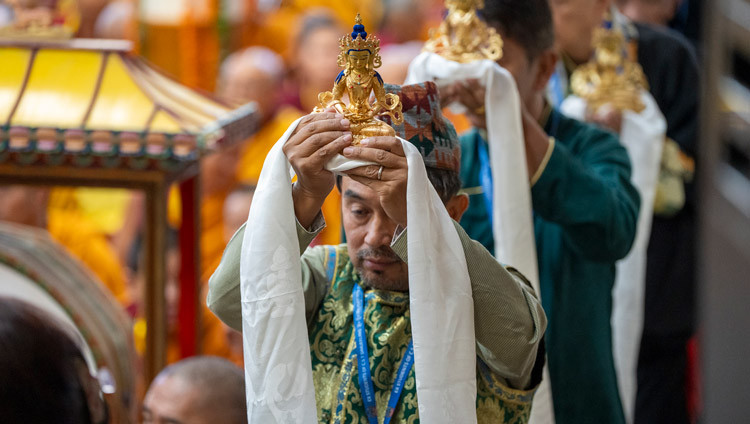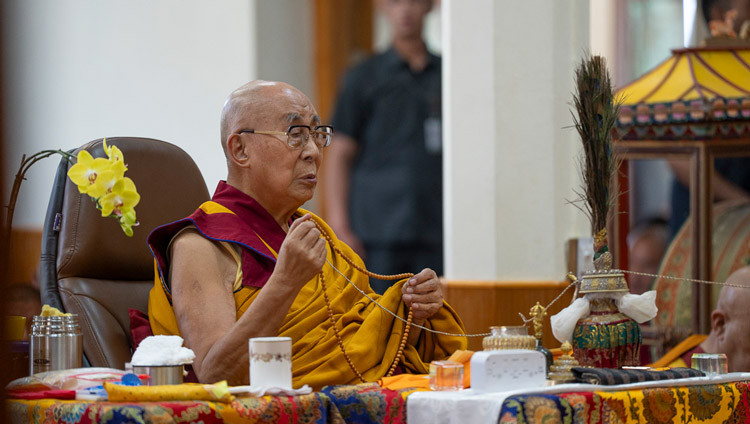Teachings on the Day Commemorating the Buddha’s Enlightenment
Thekchen Chöling, Dharamsala, HP, India – Today is the full-moon day, the principal day, of Saga Dawa, the fourth month of the Tibetan lunar calendar, when Tibetans remember the birth and enlightenment of Buddha Shakyamuni. His Holiness the Dalai Lama walked from the gates to his residence to the Tsuglagkhang, the Main Tibetan Temple, to give a teaching by way of celebration. As he made his way up the middle of the temple courtyard, he walked from side to side to greet and wave to people gathered there.
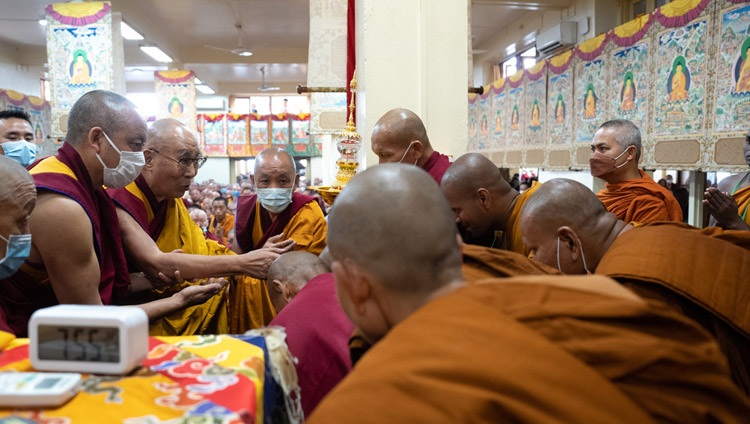
His Holiness the Dalai Lama greeting a group of Theravada monks as he arrives inside the Main Tibetan Temple for his teaching commemorating the Buddha’s birth and enlightenment in Dharamsala, HP, India on June 4, 2023. Photo by Tenzin Choejor
Reaching the temple, he greeted a group of Theravada monks who were seated to the right of the throne and in the front row of monks before it. From the steps to the throne, His Holiness raised his folded hands to pay his respects to the Buddha and paused a moment in silent prayer. The ‘Heart Sutra’ was recited in Tibetan as he took his seat, followed by a mandala offering. Tea and bread were served.
“Today, my Dharma brothers and sisters,” His Holiness began, “is when we followers of the Buddha remember the Buddha’s attaining enlightenment.
“As it is said, ‘the Sages do not wash unwholesome deeds away with water, nor do they remove the sufferings of beings with their hands. Neither do they transplant their own realization into others. It is by teaching the truth of suchness that they liberate beings.’
“Motivated by compassion, the Buddha’s intention was to teach to lead sentient beings out of suffering. For many aeons he thought of benefiting sentient beings and ultimately became enlightened. He taught that suffering comes about as a result of causes and conditions. Those causes and conditions are not related to an external agent, such as a creator god, but come about because of sentient beings’ unruly minds. Since we tend to be overwhelmed by attachment, anger and hatred, we engage in actions and create karma, which gives rise to suffering.
“Although things are merely designated and have no objective or independent existence, they appear to exist from their own side and we grasp at that appearance of independent existence. That is to say, we grasp at a distorted view. To help beings clarify this distorted view, the Buddha taught the Four Noble Truths, that suffering must be known and its causes eradicated, cessation must be actualized by cultivating the path.
“He also taught that suffering occurs on different levels of subtlety: the suffering of suffering, the suffering of change and existential suffering. The direct causes and conditions of suffering lie in our actions and mental afflictions. Our distorted view that things have an objective, independent existence is at the root of our mental afflictions. The Buddha taught that, contrary to this, all phenomena are devoid of a substantial core or essence—they are empty of inherent existence. Understanding this acts as a counter force, and the better we understand it the more our mental afflictions are reduced.”
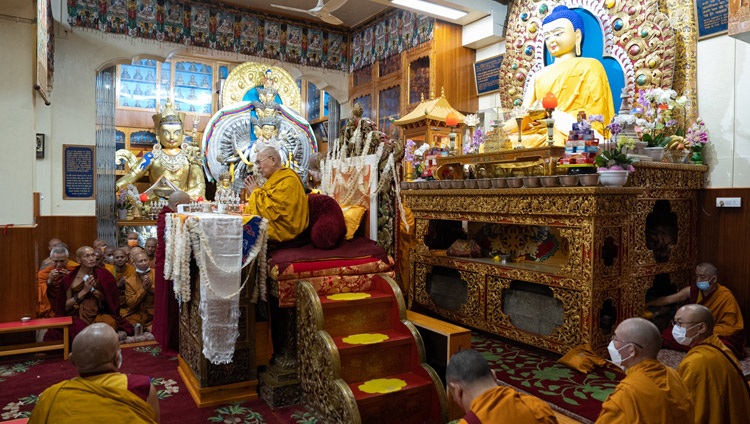
His Holiness the Dalai Lama addressing the congregation gathered to attend his Saga Dawa teaching at the Main Tibetan Temple in Dharamsala, HP, India on June 4, 2023. Photo by Tenzin Choejor
His Holiness took up the ‘Eight Verses for Training the Mind’, He pointed out that most of us are subject to pride and arrogance, but this text advises us not to see ourselves as better or superior to other people. The second verse says: ‘Whenever I’m in the company of others, may I regard myself as inferior to all.’ Other human beings, he pointed out, are just like us; they have faults too, but that’s no reason to dismiss or feel disdain for them. If you think of yourself as lower than everyone else, you’ll sow the seed of greater qualities. Humility leads to high status.
The next verse advises, “Don’t let yourself be overcome by mental afflictions.” The Buddha and the great masters who came after him showed how to overcome negative emotions.
“After Buddhism came to Tibet,” His Holiness remarked, “several different traditions arose, such as the Sakya, Nyingma, Kagyu and the Kadampas following the great Indian master, Atisha. The Kadampa masters were renowned for their humility. One of them, the author of these ‘Eight Verses’, Geshé Langri Thangpa was known as Lang-thang with the long face. He wept at the plight of sentient beings. His cultivation of bodhichitta, the awakening mind, was such that he was determined to be of help to others. I recite these verses of his every day.
“As the third verse says, whatever you’re doing and wherever you are, when negative emotions or mental afflictions arise, counter them. When others criticize or abuse you, don’t think of retaliating, offer the victory to them.
“Where the sixth verse says if someone does great wrong by harming you, see them as an excellent spiritual friend, it means that instead of being angry with them, generate compassion. There are communist leaders in China who criticize me and condemn Tibetan culture, but they act this way out of ignorance, short-sightedness and narrow-mindedness—that’s why I feel compassion for them.
“Verse seven says, ‘may I take all their harm and pain secretly upon myself’ and refers to discreetly engaging in the practice of giving and taking quietly in your heart. Finally, verse eight concludes, ‘May I see all things like illusions and, without attachment, gain freedom from bondage.’”
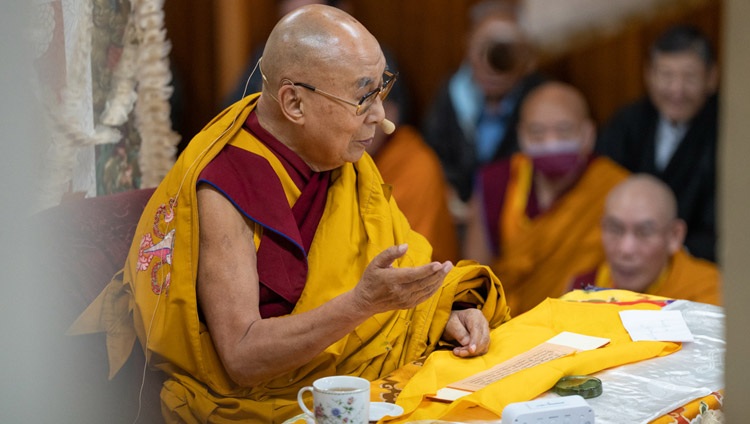
His Holiness the Dalai Lama commenting on ‘Eight Verses for Training the Mind’, the subject of his Saga Dawa teaching at the Main Tibetan Temple in Dharamsala, HP, India on June 4, 2023. Photo by Tenzin Choejor
His Holiness asked, “What is the main cause of a Buddha? —bodhichitta, the altruistic mind of enlightenment. On the basis of such a mind, the Buddha accumulated merit and wisdom for three countless aeons. Because of bodhichitta he became enlightened. We too should make bodhichitta our principal practice.
“As soon as I wake in the morning, I generate bodhichitta, which often brings tears to my eyes too. The Buddha’s key message was to cultivate bodhichitta. The point is not just to overcome our mental afflictions, but to reach the end of the path by attaining enlightenment.
“When you have bodhichitta, you feel at ease. Anger, hatred and jealousy subside, consequently you can be relaxed and sleep soundly. As people with faith in Avalokiteshvara, you can think of him at the crown of your head, aspire to develop qualities like his and then fall peacefully asleep.
“The Buddha taught the Four Noble Truths, the Perfection of Wisdom and the nature of the mind, but the essence of all his teachings is the altruistic mind of bodhichitta. If he was to appear among us today, his advice would be the same, develop the awakening mind of bodhichitta. All of us want to be happy and to avoid or to overcome suffering. The way to bring that about is to cultivate bodhichitta. Think of all sentient beings across the expanse of space and aspire to become a Buddha for all of them.”
His Holiness led the congregation in reciting the following verse three times to formally cultivate bodhichitta:
I seek refuge until I am enlightened
In the Buddha, the Dharma, and the Supreme Assembly,
Through the collection of merit achieved by giving and other (perfections)
May I achieve Buddhahood in order to benefit all sentient beings.
“The Buddha is our teacher,” he observed, “and it’s because he had Buddha-nature that he was able to train in the path and become a fully awakened being. We too have Buddha-nature and through study and practice can overcome all obstacles to attain enlightenment as he did. If we cultivate bodhichitta steadily, our lives will become worthwhile, meaningful and we can feel at ease—and that’s all for today.”
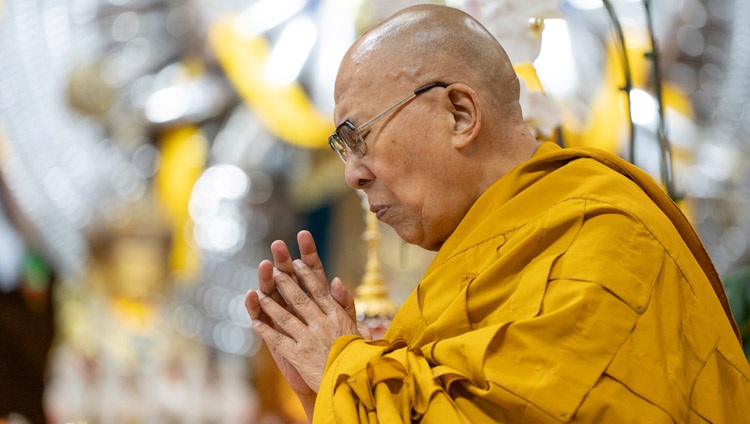
His Holiness the Dalai Lama joining in prayers at the conclusion of his Saga Dawa teaching at the Main Tibetan Temple in Dharamsala, HP, India on June 4, 2023. Photo by Tenzin Choejor
The Chant-master led a number of prayers that included the thanksgiving mandala, a prayer to the Dharma protectors, a prayer for the flourishing of the Dharma and the Prayer of the Words of Truth.
Having stepped down from the throne, His Holiness came to the edge of the platform and led a threefold recitation of the verse from the end of Jé Tsongkhapa’s ‘Great Treatise on the Stages to the Path to Enlightenment’:
“Wherever the Buddha’s teaching has not spread
And wherever it has spread but has declined
May I, moved by great compassion, clearly elucidate
This treasury of excellent benefit and happiness for all.
This he followed with the last two verses of the Prayer of the Words of Truth:
Thus, the protector Chenrezig made vast prayers
Before the Buddhas and Bodhisattvas
To fully embrace the Land of Snows;
May the good results of these prayers now quickly appear.
By the profound interdependence of emptiness and relative forms,
Together with the force of great compassion
in the Three Jewels and their Words of Truth,
And through the power of the infallible law of actions and their fruits,
May this truthful prayer be unhindered and quickly fulfilled.
Smiling and waving to members of the audience, His Holiness continued to repeat the final verse as he walked from the temple towards his residence.



